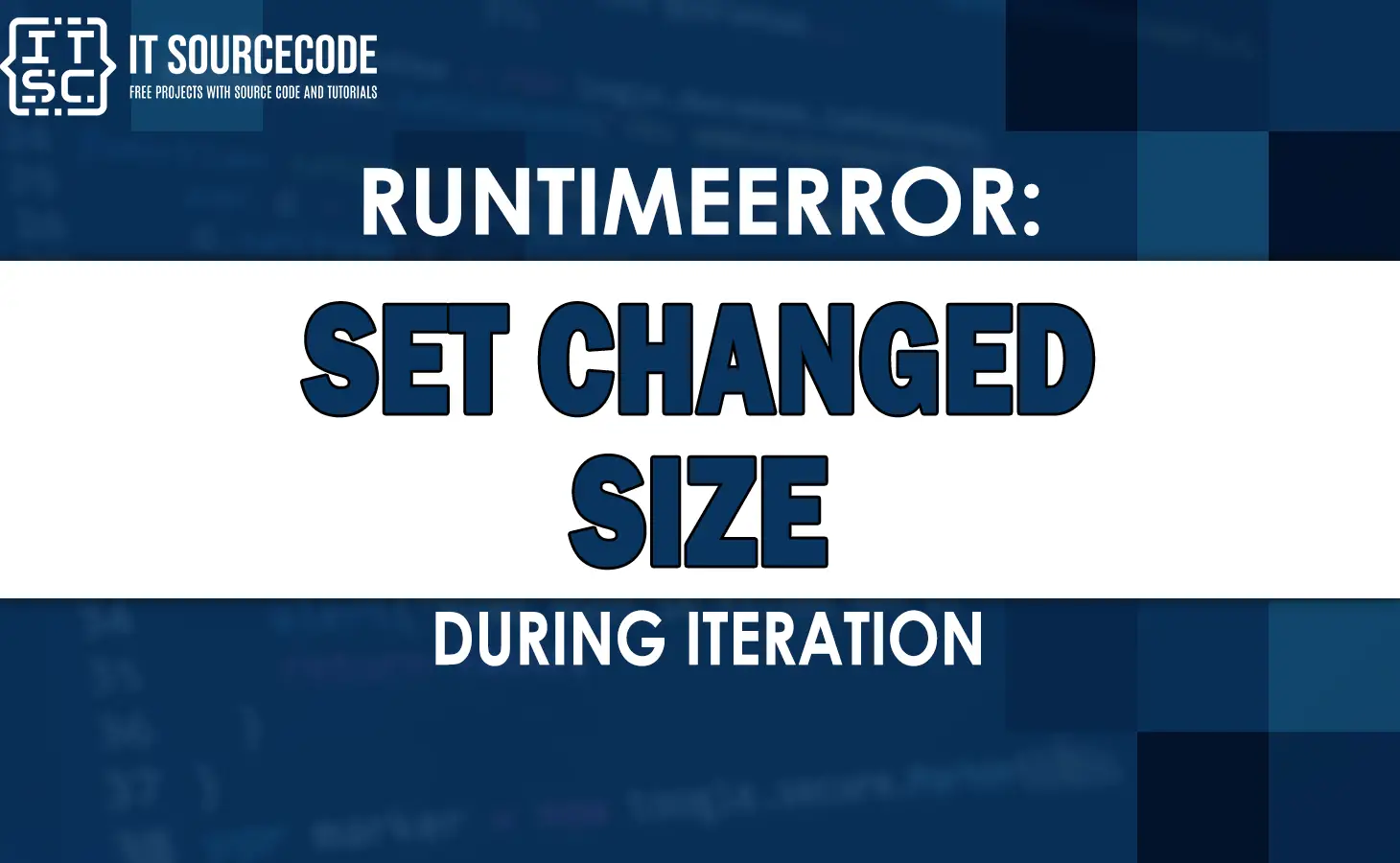In running a Python program, encountering errors is not uncommon issue, and one of the errors that programmers often encounter is:
RuntimeError: Set Changed Size During Iteration
This error typically occurs when iterating over a set and changing its size simultaneously, leading to unexpected action and possibly causing the program to fail.
In this article, we will discuss this error, understand its causes, and provide some examples and solutions to resolve it.
How to Reproduce the Error?
The Set Changed Size During Iteration error occurs if there is an attempt to modify a set while iterating over it.
Let’s have a look at the example to understand this issue:
my_set = {1, 2, 3, 4, 5}
for item in my_set:
if item % 2 == 0:
my_set.remove(item)Output:
Traceback (most recent call last):
File “C:\Users\Dell\PycharmProjects\Python-Code-Example\main.py”, line 3, in
for item in my_set:
RuntimeError: Set changed size during iteration
In the example above, the error occurs because we are modifying the set’s structure while still iterating over it.
To fix this error, we can utilize several methods. Let’s look at some solutions:
Solutions to Fix the RuntimeError Set Changed Size During Iteration
Here are the following solutions to fix the RuntimeError Set Changed Size During Iteration.
Solution 1: Create a Copy of the Set
One way to prevent changing the set during iteration is by creating a copy of the set and performing modifications on the copied set.
This is to make sure that the original set is still unchanged while we iterate over it.
Here’s an updated version of the previous example using this solution:
my_set = {1, 2, 3, 4, 5}
copy_set = my_set.copy()
for item in copy_set:
if item % 2 == 0:
my_set.remove(item)
print(my_set)By iterating over the copy of the set copy_set and modifying the original set my_set, we can prevent the avoid the error from occurring.
Output:
{1, 3, 5}
Solution 2: Use a Secondary Set for Removal
Another solution to solve the error is to utilize a secondary set to store the elements that need to be removed.
We iterate over the original set and add the elements to be removed to the secondary set.
Once the iteration is complete, we can remove the elements from the original set using the secondary set.
Let’s see this example code below:
my_set = {1, 2, 3, 4, 5}
remove_set = set()
for item in my_set:
if item % 4 == 0:
remove_set.add(item)
my_set -= remove_set
By separating the removal process from the iteration, we eliminate the RuntimeError Set Changed Size During Iteration issue.
Output:
{1, 2, 3, 5}
Solution 3: Iterate Over a Copy of the Set
An alternative solution to solve this error is to iterate over a copy of the set instead of the original set.
By iterating over a duplicate, we can change the original set without encountering the error,
Here is an example:
my_set = {1, 2, 3, 4, 5}
for item in my_set.copy():
if item % 5 == 0:
my_set.remove(item)
print(my_set)In this example, we create a copy of my_set using the copy() function, and then iterate over the duplicate set.
As we remove even numbers from the original set, the error is prevented.
Output:
{1, 2, 3, 4}
Solution 4: Use a List Comprehension
List comprehensions provide a precise and efficient way to change a set while avoiding the error.
By generating a new set with the desired elements, we can replace the original set with the modified set.
Here’s an example:
my_set = {1, 2, 3, 4, 5}
my_set = {item for item in my_set if item % 2 != 0}
print(my_set)In this example, we use a set comprehension to create a new set that eliminate even numbers.
By assigning this new set back to my_set, we effectively replace the original set.
Output:
{1, 3, 5}
Solution 5: Use Exception Handling
Another method to solve the error is to use exception handling. By catching the error and handling it properly, we can continue the iteration without interruption.
Here’s an example:
my_set = {1, 2, 3, 4, 5}
for item in my_set:
try:
if item % 2 == 0:
my_set.remove(item)
except RuntimeError:
continue
- In this example, we enclose the code that changes the set within a try block.
- If the RuntimeError is raised, we catch it with an except block and use continue to proceed to the next iteration.
- This allows the loop to continue without terminating due to the error.
Additional Resources
- runtimeerror: either sqlalchemy_database_uri or sqlalchemy_binds must be set.
- Runtimeerror: expected scalar type bfloat16 but found float
- Runtimeerror: expected scalar type half but found float
- Runtimeerror: found dtype long but expected float
Conclusion
In conclusion, the RuntimeError: Set Changed Size During Iteration error can be frustrating, but with the solutions provided in this article, you now have a clear understanding of how to fix it.
Remember to avoid modifying the size of a set while iterating over it, and consider using techniques such as creating a copy, using a secondary set, list comprehensions, or exception handling to tackle this error effectively.
Frequently Asked Questions (FAQs)
The RuntimeError: Set Changed Size During Iteration error occurs if a set is modified while it is being iterated over.
This modification changes the size of the set and disrupts the ongoing iteration, leading to the error.
No, this specific error is related to sets in Python. It doesn’t occur with other data structures like lists or tuples.
To prevent the RuntimeError Set Changed Size During Iteration, make sure that you won’t modify the size of a set while iterating over it.
Yes, if you have nested iterations where both the outer and inner loops modify the set, you may encounter the this error.
It’s important to carefully manage and synchronize the modifications to avoid this issue.

